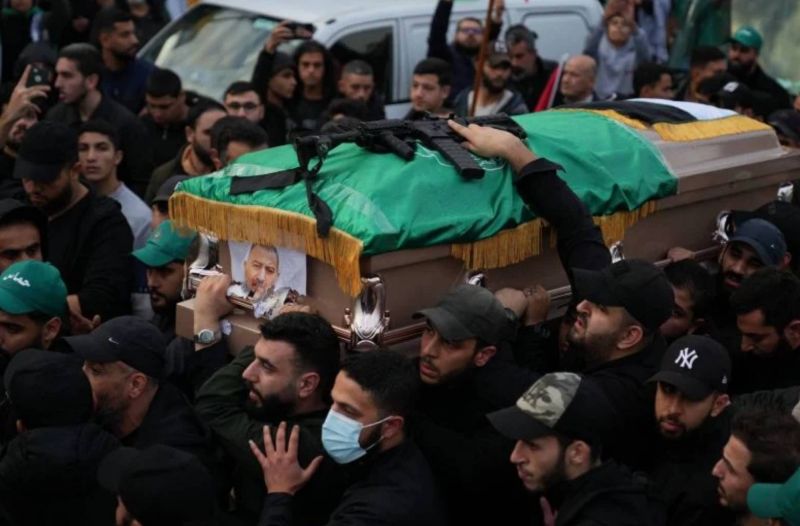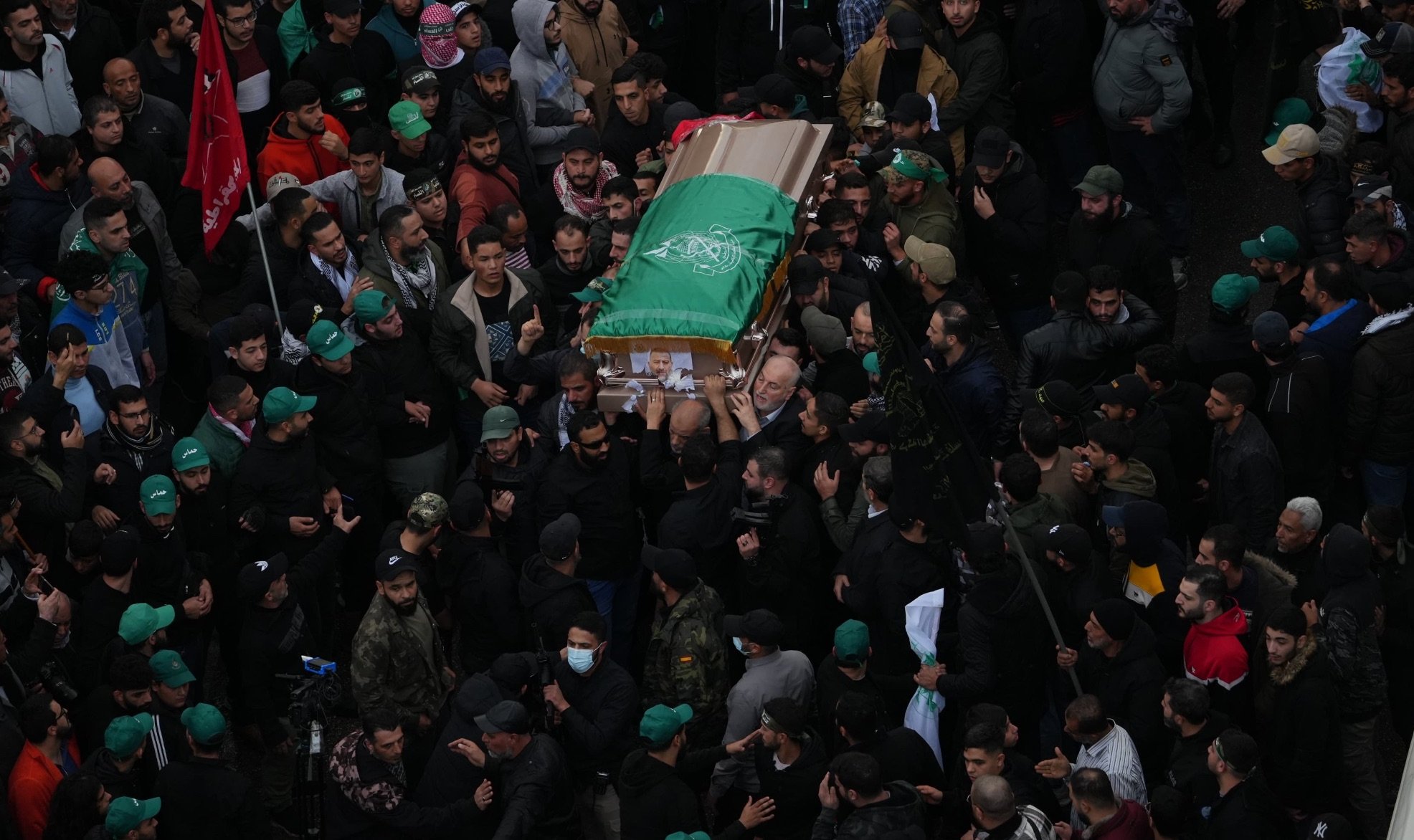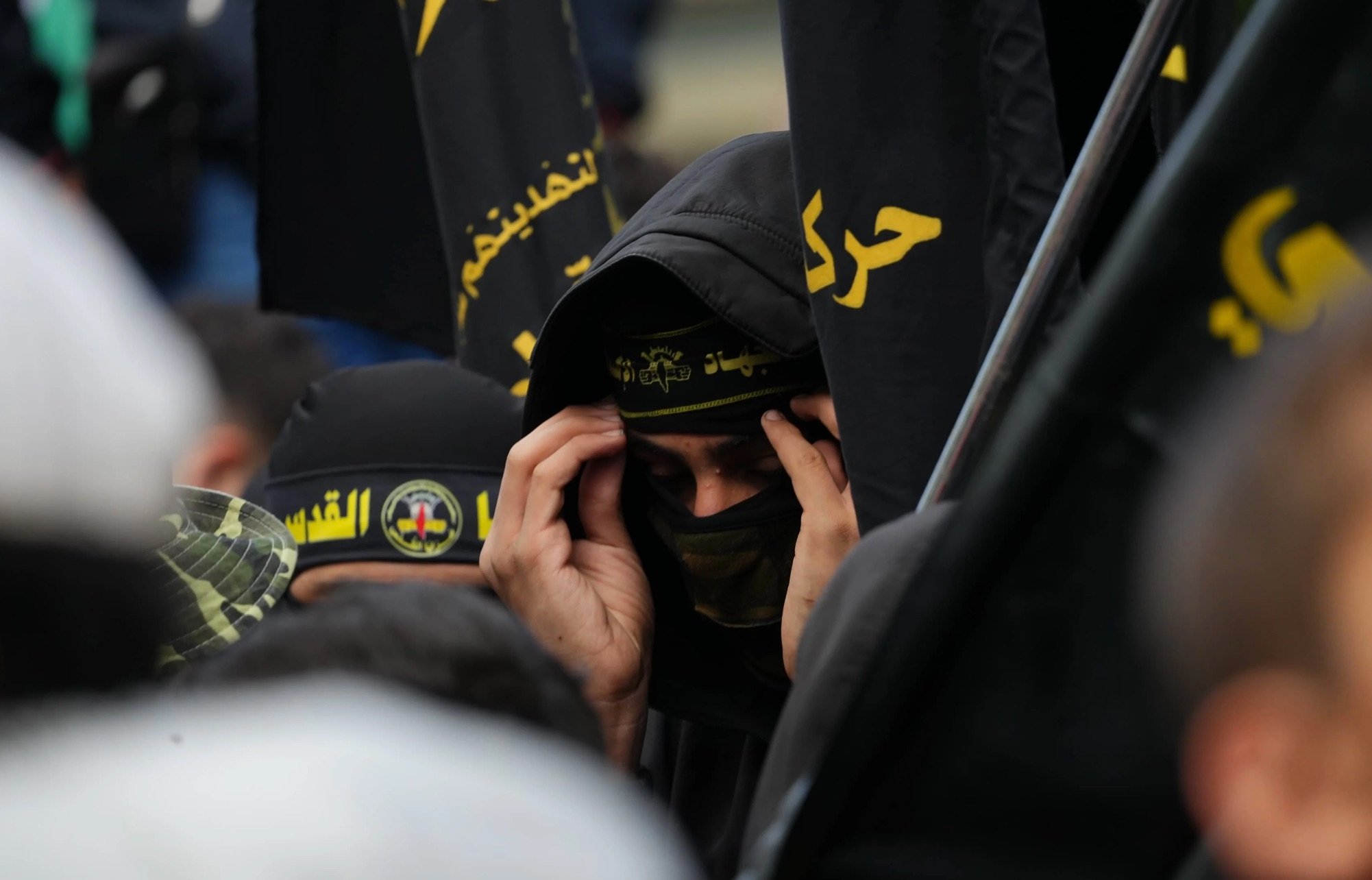
Assassinated Hamas official Saleh al-Arouri was buried in Beirut on Jan. 4, 2024. (Credit: Mohammad Yassine/L’Orient-Le Jour)
The black door of Hamas’ office in Lebanon’s Ain al-Hilweh Palestinian refugee camp is closed. Usually, a dozen or so Hamas members stand guard under the green flags and electric cables above the entrance.
But on Jan. 4, one void led to another. “They’ve all gone to Beirut to attend Saleh al-Arouri’s funeral,” said the armed guard at the entrance. He refused to say more.
“Only the leaders are authorized to speak [to the press],” and they were all preparing to bid Hamas’ second in command a final farewell. Saleh al-Arouri, the mastermind of “the unity of the fronts,” was killed in Beirut by an Israeli missile on Jan. 2, as was confirmed by Hamas and the Lebanese Army.
“It was a shock,” said Yassin*, a member of the Ezzedine al-Qassam Brigades. He appeared to be in his 20’s and spoke on condition of anonymity.
Can Arouri’s assasination shake the foundations of Hamas in Lebanon? The young fighter doesn’t believe so. “The plan of the leaders of this level is martyrdom, so his disappearance could not have been any different. It’s the same for me: since I chose the path of resistance, I couldn’t have imagined any other end,” said Yassine. He devoted his life to Hamas since the age of 16, and refused to show the slightest weakness.
But the damage has been done.
“The assassination of Saleh al-Arouri contradicts Hezbollah’s overconfidence that Israel would not strike in Dahiyeh. It shows that the Lebanese Shiite party and Hamas did not take higher security measures,” said Hassan Kotob, a Lebanese researcher.
According to Souhayb Jawhar, an expert on Islamist movements, “Israel sent out the two messages that it can hit Hamas’ top leaders and that it can do it at the heart of Hezbollah’s stronghold.”
‘No question of leaving Beirut’
“It means that we need to be more attentive, more suspicious. For example, there’s no question of taking our mobile phones with us when we are on the move,” said Yassine.
L’Orient-Le Jour met with Abou Abed Chana, Hamas’s head of security in Saida. In the green-carpeted mosque where he works on the religious education of the Islamist movement’s future recruits, Chana spoke evasively.
“Let’s just say that after this crime by the Zionist enemy, which crossed all red lines, Hamas will take all the necessary precautions. This was already the case, but Israeli high tech combined with US money made it possible to include weak people in this criminal project that saddens us,” he said, suggesting that an information leak was behind the strike.
“Hamas leaders are going to increase the number of their bodyguards, move their offices and travel more often, using other routes. But leaving Beirut is out of the question,” said Saqr Abu Fakhr, a researcher at the Institute for Palestinian Studies in Beirut.
“Many Palestinian leaders were assassinated in the Lebanese capital, including Ghassan Kanafani and Kamal Adwan, but they did not flee,” he added.
On the contrary, “Hamas has decided that Lebanon is going to become a key area in its confrontation with Israel, because it can count on the support of Hezbollah and the solidarity of the Sunni public opinion,” argued Jawhar. This solidarity was symbolized by the burial of Arouri in Beirut’s Sunni Tariq al-Jdideh neighborhood.
Hamas’s presence in Lebanon “is necessary because it can maintain its political and communications activities with relative freedom of movement, at a time when the war in Gaza risks spreading across the country,” said Kotob.
 Scene from al-Arouri's funeral on Jan. 4 2024, in Beirut. (Credit: Mohammad Yassine/L’Orient-Le Jour)
Scene from al-Arouri's funeral on Jan. 4 2024, in Beirut. (Credit: Mohammad Yassine/L’Orient-Le Jour)
‘The retaliation will be painful’
More importantly, said Chana, Hamas “does not depend on its figures. Even its founder, Sheikh Yassin, was killed. Each time, this only strengthens the movement.”
The same goes for the determination of its base to fight back. “There is a before Jan. 2 and an after Jan. 2. The young people now want revenge and are redoubling their efforts to prepare for resistance,” said Yassin. “We are now preparing for something very big in Lebanon.”
“We can’t do anything here without the consent of Hezbollah, which defines the context of our actions,” Yassin nuanced.
According to Fakher, “for a response commensurate with the Jan. 2 assassination, an Israeli leader of the same level would have to be brought down. Hamas will not get its revenge by firing rockets from Lebanon. So, it’s going to take a long time for the response to come.”
And it won’t come from Lebanon, said Chana. “Hezbollah will retaliate against the Zionist enemy. And Hamas too, but in Palestine, and its revenge will be painful,” he warned.
Hezbollah’s Secretary General Hassan Nasrallah warned in his Jan. 3 speech that Arouri’s assassination “will not go unpunished.” Nasrallah added, “If the enemy thinks of waging a war against Lebanon, we will fight without restraints, without rules, without limits, without restrictions, and it knows what that means.”
Yassin is preparing for the day that “Hamas would then be in the front line.”
“Our aim is to reproduce an Oct. 7 in Lebanon. We’ve been training for this for years,” he said, in reference to Operation al-Aqsa Flood.
Despite being young, Yassin said he already traveled to Iran twice for “very difficult” training.
“For two months, you literally fight a war, including surprise attacks, warplanes, rockets, live ammunition, everything,” he said, adding that these military training courses are supervised by Iranians and Lebanese and involve the entire “resistance axis.”
‘Always be ready’
“If Hezbollah raises the ceiling imposed on Hamas, the latter has the capacity to quickly mobilize forces in Lebanon, particularly because of Arouri’s action,” said Jawhar.
In the Ain al-Hilweh camp, whose facades are riddled with bullet holes due to the recent fighting between Fatah and Islamist groups, Yassin explained that Hamas does not take part in the inter-Palestinian fighting in Lebanon, as it is focused on a single objective of “Freeing Palestine.”
According to Yassine, 80 percent of the refugees in Ain al-Hilweh support the Islamist movement. For them, the surprise incursion on Oct. 7, which left some 1,200 people dead, has made the possibility of a return to the country more tangible. Since the announcement of the creation of the Al-Aqsa Flood Vanguard unit at the beginning of December, young people from the camp have been flocking in.
“Many of them can’t stand doing nothing while seeing women and children dying in Gaza. Hamas launched this initiative to appease and organize them,” he said. In addition to religion courses, “they learn basic military concepts so that they know how to respond in the event of an invasion by the Zionist enemy,” he said.
It has nothing to do with the rigorous recruitment imposed on future fighters. “Joining Hamas can take at least three years and involves a lot of sacrifice. We work hard to be ready at all times,“ Yassine said.
“On Wednesday, he [Nasrallah] said that he would give all the details of Hezbollah’s forthcoming response in his speech on Friday. So I’m getting ready. It could be tomorrow, the day after tomorrow, I’m waiting for the call and I won’t back down. On the contrary.”
 A Palestinian Islamic Jihad member mourns during the funeral of Saleh al-Arouri. Jan. 4, Beirut. (Credit: Mohammad Yassine/L’Orient-Le Jour)
A Palestinian Islamic Jihad member mourns during the funeral of Saleh al-Arouri. Jan. 4, Beirut. (Credit: Mohammad Yassine/L’Orient-Le Jour)
*First name has been changed.
This article was originally published in French in L'Orient-Le Jour. Translation by Joelle El Khoury.